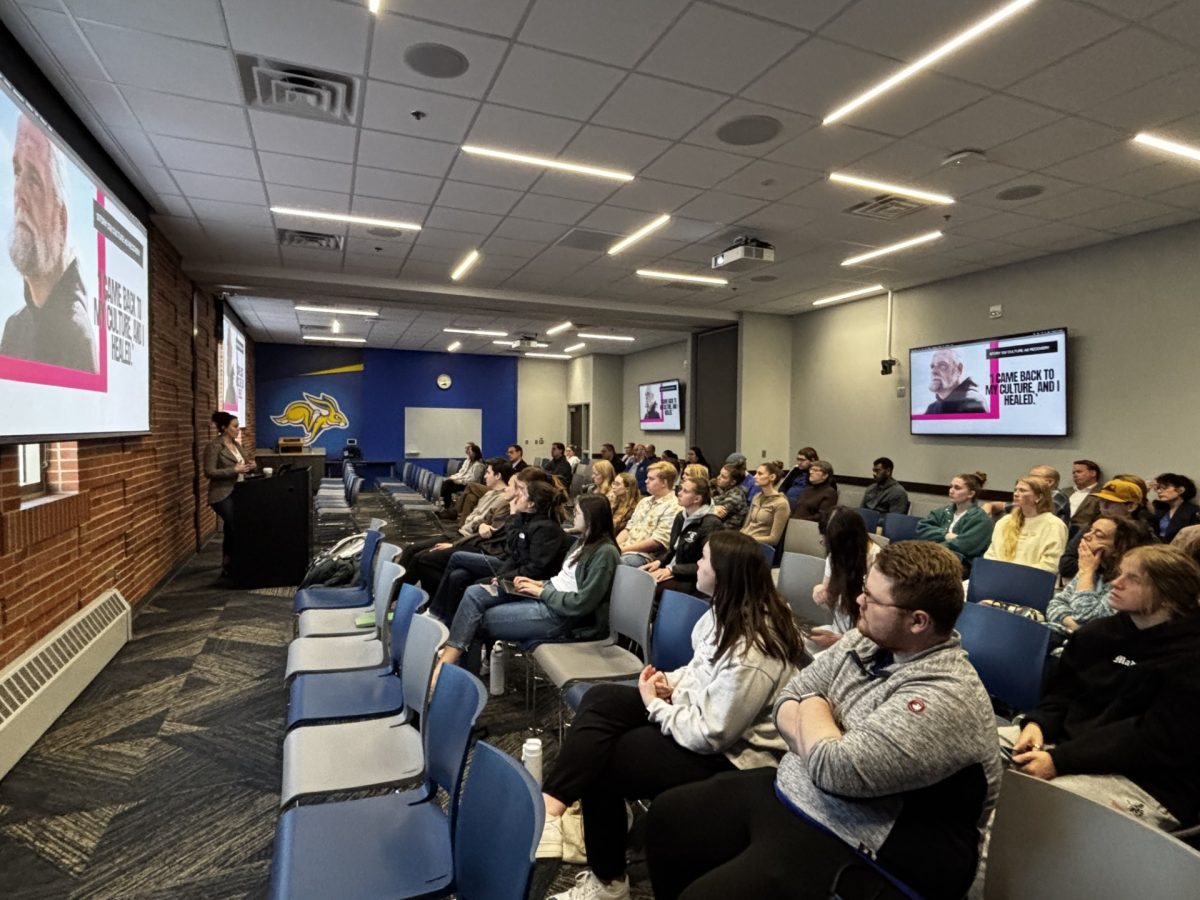Pulitzer Center grantee Elyse Wild shared her Pulitzer project on the opioid crisis in Native American communities with South Dakota State University students, faculty, and staff on April 8.
Wild’s project, “Two Medicines: Reporting on How Culture is Healing Native American Communities from the Opioid Crisis,” is a three-part series that examines how Native communities are addressing the crisis.
“[The project] looks at the spectrum of addiction care, from prevention, to harm reduction, to recovery,” Wild said.
The project took Wild across the United States. Her three articles featured subjects from Native communities in Oregon, Oklahoma and Maine.
The first article, “‘You Can’t Gangster a Horse’: Native Youth Connect With Culture To Break Cycles of Addiction” introduced John Spence, a citizen of the Gros Ventre tribe. Spence works with youth at the Native American Rehabilitation Association of the Northwest in Oregon at a 90-day prevention program.
Spence specifically works with youth by leading them in Native horsemanship practices. This prevention program aims to help youth with troubled pasts by connecting them to their culture. Wild noted that the success of prevention programs can be difficult to measure.
“You might not see results for another generation or two,” Wild said. “But these kids – what they’re expressing and what they’re feeling, that’s the measure of success in these programs.”
Wild visited with Choctaw Nation Behavioral Health workers in Oklahoma for the second article in her series, “Choctaw Nation Found a Better Way To Deliver Harm Reduction. It’s Working.” She explained how Choctaw Nation uses OD maps, a technology requiring first responders to report overdoses, to strategically distribute harm reduction resources like naloxone, clean needles and fentanyl testing strips.
Harm reduction practices often come with stigma. The use of OD maps allows the harm reduction drive to be set up in areas of the community where they are most needed, according to Wild.
“It’s this signaling to people like ‘You are still welcome in our community. We still love you. You are our people,’” Wild said.
Her final article, “‘I Came Back to My Culture, and I Healed,’” focused on recovery. She traveled to Maine, where she met Steve Knockwood, a Mi’kmaq Nation citizen and peer recovery coach for Wabanaki Public Health and Wellness. Wild highlighted the unique challenges faced by Maine’s tribal communities, such as being the only state that does not recognize tribal sovereignty, which limits their access to federal funding.
“The situation overdose-wise is very, very bleak,” Wild said.
Wild said Knockwood works directly with those actively using drugs, connecting those ready for recovery with treatment centers and offering support to those still in active addiction.
Before becoming a peer support specialist, Knockwood spent time in prison after getting caught trafficking drugs. In prison, cultural programming helped him connect back with his culture and begin to heal, according to Wild.
“They had cultural programming in the prison, and that’s where, as [Knockwood] puts it, he ‘came back to his culture,’” Wild said.
In addition to her public lecture, Wild visited various classes to share her project with students and held office hours during her visit to South Dakota State University.
“There’s nothing better than young, excited journalism students,” Wild said. “I learn from you guys, too. Just seeing your guys’ enthusiasm … just the part of life that you guys are in right now is such a great part of life, and it’s really fun to interact with students and hopefully inspire you guys a little bit with some of my story.”
Annie Witt, a junior journalism major who attended both Wild’s lecture and her multimedia reporting class that Wild visited, said she appreciated Wild’s focus on an often-overlooked issue.
“It’s a really interesting topic that’s not talked about often,” Witt said. “So, to have someone who has researched so deeply into it and has the chance to meet all these people across the country, it’s eye-opening and unique.”
Wild is a first-time Pulitzer Center grantee and is a senior editor of Native News Online. Her next project will take her to Alaska, where she will be reporting on maternal health in remote tribal communities.
Categories:
RECAP: Elyse Wild speaks about addiction in Indigenous communities
Emily DeCock, News Editor
April 29, 2025
Pulitzer Center grantee Elyse Wild is seen here giving a presentation on her three articles about addiction in Native communities and the efforts to help people struggling with it. She based the three articles she wrote off Native communities in Oregon, Oklahoma and Maine.
0
More to Discover
About the Contributor
Emily DeCock, Assistant News Editor


















